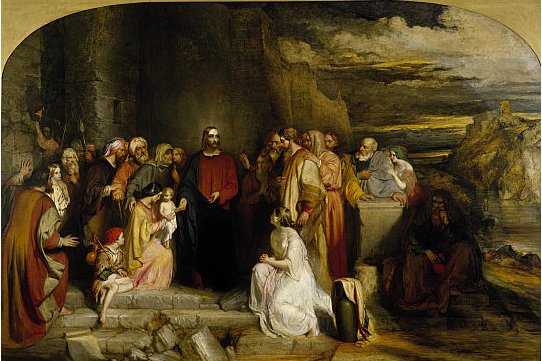
Image: Robert Scott Lauder, Christ Teacheth Humility [Public Domain]
As we said in our previous post about humility, this virtue is rooted in the self-knowledge of our impoverishment that results from a radical encounter with our fragile condition. In keeping with the quote of St. Bernard cited in the first post, Venerable Louis of Granada writes in The Sinner’s Guide, “Whoever, therefore, seriously desires to acquire humility must earnestly labor to know himself. How, in fact, can he be otherwise than humbled who, looking into his heart with the light of truth, finds himself filled with sins; defiled with the stains of sinful pleasures; the sport of a thousand errors, fears, and caprices; the victim of innumerable anxieties and petty cares; oppressed by the weight of a mortal body; so forward in evil and so backward in good? Study yourself, then, with serious attention, and you will find in yourself nothing of which to be proud.”
Humility and truth
Humility does not mean that we mercilessly put ourselves down, but rather that we, for once, have an honest gut-check and stop fooling ourselves. Some people take this gut-check and adopt pride, the opposite of humility, by refusing to accept the truth. We have all come across this (and perhaps even expressed it ourselves!). A manifestation of this comes, for example, when anybody who dares to admonish the sinner for his or her wrongdoings is deemed judgmental and sanctimonious. Why does this happen? Because the prideful one does not wish to accept his or her faults. Others, by contrast, may adopt a false humility. This is a caricature of humility that stems from pride because it feigns abjection for the sake of attention and praise. The humble, however, take the gut-check and start the progression to a greater knowledge and love of God.
The perfect model of humility
Should we be struggling with where to begin the process of acquiring such a great virtue, we can start by striving to imitate our Lord, the perfect exemplar of humility. Humility means nothing for God in His essence—to Whom could the Almighty ever subject Himself? Yet by the Incarnation, God the Son has assumed a human nature to Himself, and through this nature, Christ can live a humble life.
Thus, our Lord leaves us a striking model of humility. What could possibly stir our hearts against pride as much as seeing the Son of God humble Himself to take on our human weaknesses (in all things but sin) for the sake of love for us poor sinners? Furthermore, think of all the ways that Christ was humiliated in His life: born in complete poverty with no room at the inn, scourged, mocked, ridiculed, scorned by His own people, the infinite love of His Sacred Heart nailed to the cross. And consider the way that He continues to humiliate Himself: immolating Himself daily under the humble appearance of bread and wine, just to still be present with us. The list is never ending! As the spiritual greats have always noted, all the more is this humility shocking and praiseworthy because it is truly a Divine Person living this out.
We rejoice at the famous antiphon, “O marvelous exchange! Man’s Creator has become man, born of the Virgin. We have been made sharers in the Divinity of Christ who humbled Himself to share our humanity.” Need we still exalt ourselves and think we have no need of this love and mercy? And as a testament to the fulfillment of His own declaration that “whosoever shall exalt himself shall be humbled: and he that shall humble himself shall be exalted,” we have the famous doctrine of St. Paul on our Lord:
“For let this mind be in you, which was also in Christ Jesus: Who being in the form of God, thought it not robbery to be equal with God: But emptied Himself, taking the form of a servant, being made in the likeness of men, and in habit found as a man. He humbled Himself, becoming obedient unto death, even to the death of the cross. For which cause God also hath exalted Him, and hath given Him a name which is above all names: That in the name of Jesus every knee should bow, of those that are in Heaven, on earth, and under the earth: and that every tongue should confess that the Lord Jesus Christ is in the glory of God the Father”
(Philippians 2:5–11, Douay-Rheims).
True greatness
When we embrace humility, we embrace the very life of Christ in our own souls. Hence the first beatitude, the first step on the path to blessedness in imitating the life of Christ, requires that we be “poor in spirit” (see Matthew 5:3). Poverty of spirit is not about avoiding great things, for great things God deigns to do with us! After all, look at the greatness of the salvation ushered in by the humility of Mary’s fiat—“be it done to me according to thy word” (Luke 1:38). Rather, it is about avoiding seeking great things through reliance upon our own powers and impoverished condition. May we always say instead, with King David, “A sacrifice to God is an afflicted spirit: a contrite and humbled heart, O God, Thou wilt not despise” (Psalm 50:19).
Want to learn more about humility and the other virtues? Registration is now open for The Art of Living.

